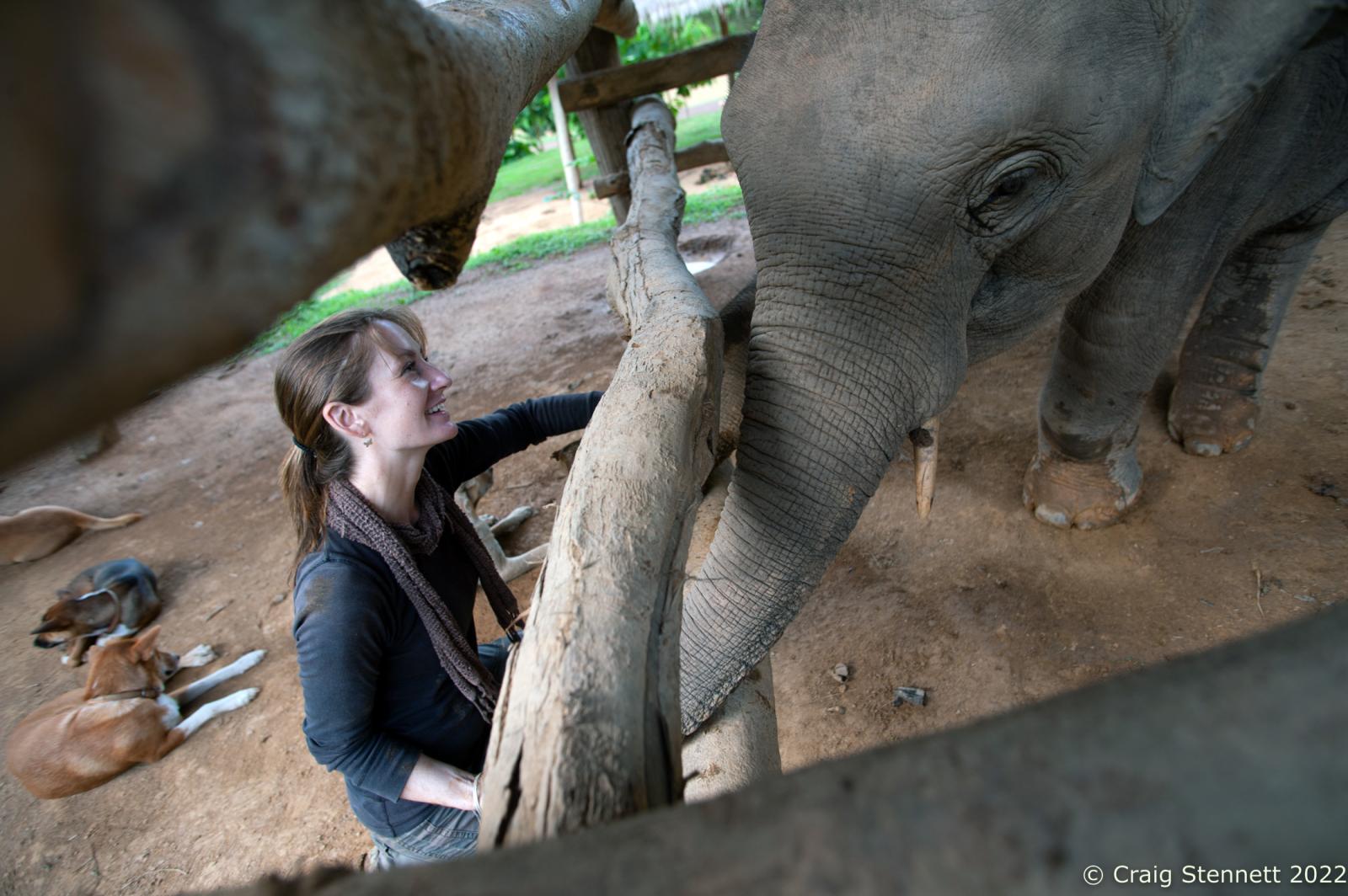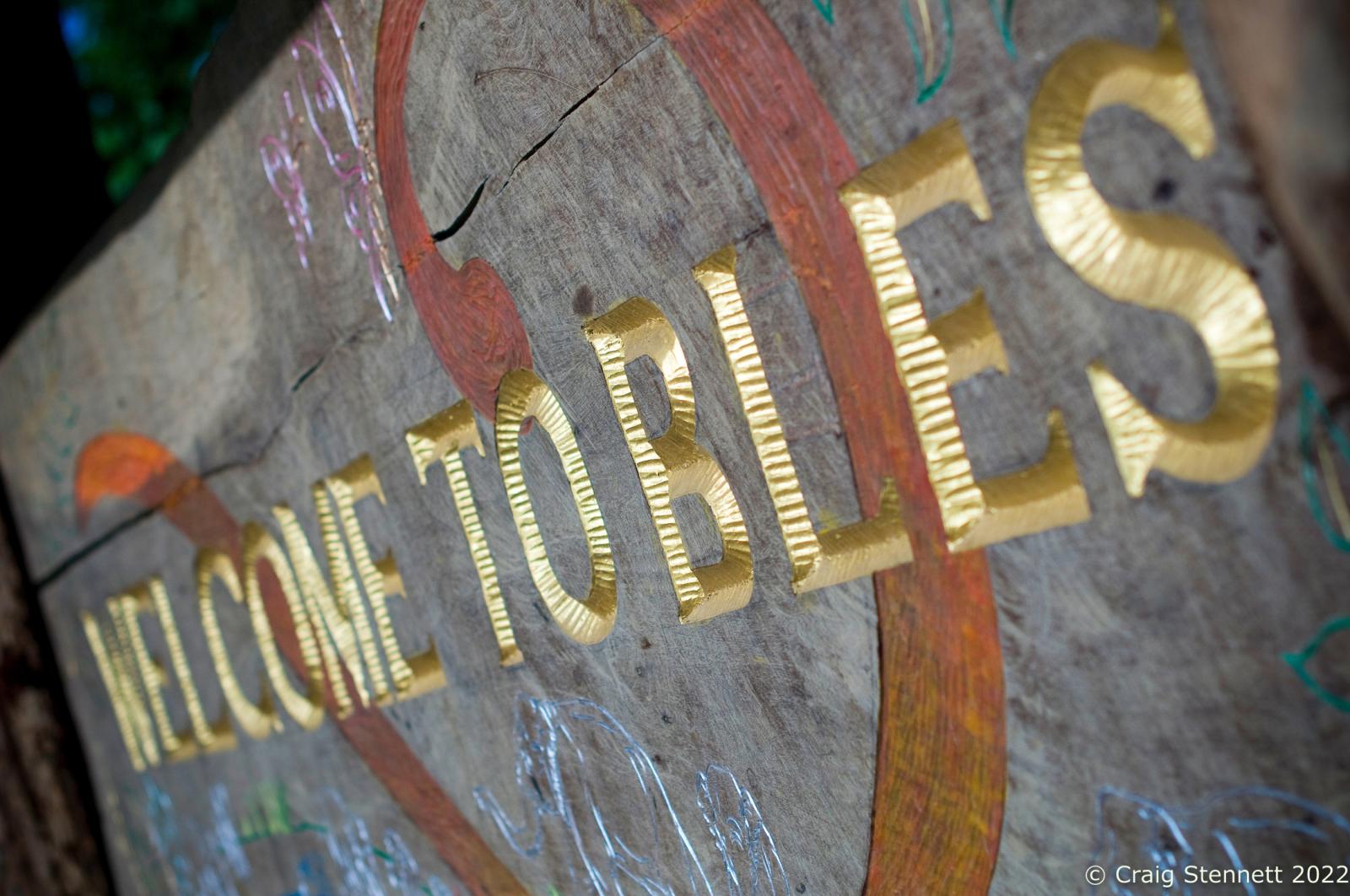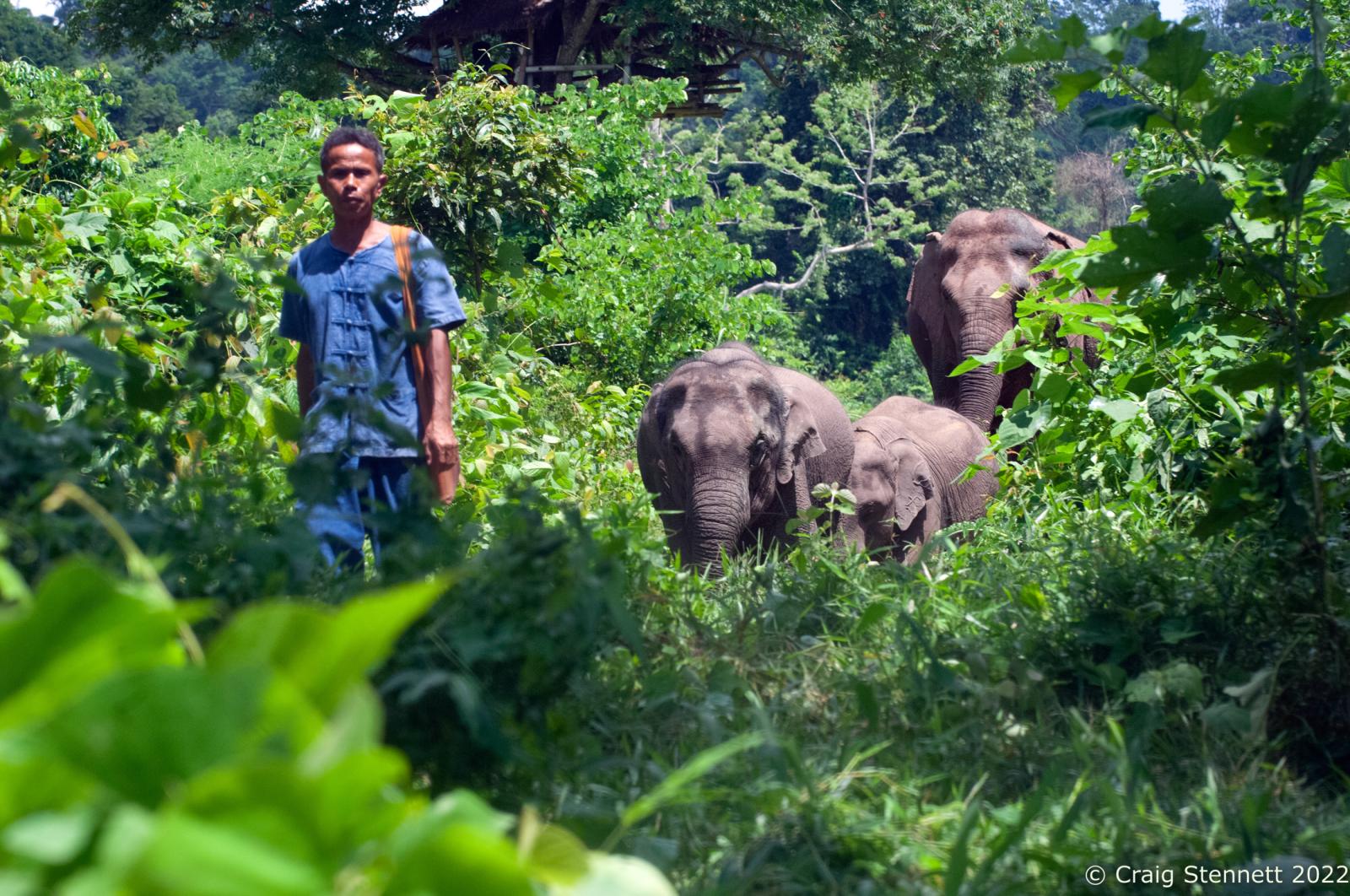A Life Less Ordinary
Katherine Connor-Elephant Rescue-Thailand
It's 7pm on a Wednesday evening and Katherine Connor has just walked into the buzzing weekly night market-taking place in Uttarardit, a provincial town situated on the banks of the Nan River in North Thailand. The 30-year-old Londoner, holding her 18-month-old son Noah in her arms and with her 3-year-old daughter Hope nearby, is exchanging concerned looks with her Thai husband Anon. With the sun quickly setting, a constant stream of traffic passes by on an adjacent road. The noise and fumes are intensifying all around while they are greeted by the sight of two baby Asian elephants being used as street beggars for their owners. A faint cover of commerce is being given as the elephants hold small sugar cane bags costing the buyer fifty pence at the tip of their trunks. Any purchaser will then be offered the delights of feeding the nutrient free cane back to the animals. “That one is a one year old, the other looks like three. They’re both dehydrated. Look, scars around the neck, fresh stab wounds to!” Katherine says in fluent Thai to her husband. Both of these young elephants should still be with their mothers and still being weaned. A feeling of dé-ja vue descends on the pair as they consider their next move.
In 2002, Katherine Connor left her successful retail management career with GAP, sold her house in London and embarked on what she thought would be her adventure of a lifetime - travelling around the world for a year. “I loved my life, I loved living in London and working in the West End and I loved my career. I just knew that there must be something more”, Katherine, remembers. With Hong Kong, Singapore and Malaysia under her belt she entered The Royal Kingdom of Thailand in South East Asia.
Six weeks after arrival, having spent just a day at an elephant centre, she had met, fallen in love with and bought a 6-month-old baby elephant called Boon Lott (meaning survivor in Thai) for its own protection. “I’d never felt such an incredible draw to another being as I did when I met Boon Lott”, she recalls. The little creature had been born premature and got rid of as quickly as possible by its owner, so the mother could return to the profitable business of illegal logging on the northern Thai-Burmese border. Katherine knew that without the milk and natural bond of its mother Boon Lott would most certainly die. A contract was drawn up guarantying a mother-calf contact for the required weaning period of 3 years minimum, and £3500 changed hands for his purchase. However, the fate of Boon Lott was only to improve for a short time now it was in Katherine’s care.
The little elephant was involved in a fall that left his hind legs paralyzed, an injury that would alone be considered by most vets to bring fatal consequences. But Katherine didn't give up on Boon Lott. Raising funds through an appeal known as “Save Baby Babar” a hydrotherapy pool was acquired. Later, an elephant wheelchair was devised with the help of the engineering department of Chiang Mai University, a world first! All this hard work was starting to deliver dividends as Boon Lott began standing for short periods unassisted. Nevertheless, the final injustice was about to come as another fall occurred while attempting an X-ray for the little elephant while Katherine was briefly absent from his side. This time, the injury was too severe and with a bone protruding from his back leg Boon Lott died on 26th June 2004 with Katherine still cradling him in her arms.
For most mere mortals this would be the end of the story: accept your loss, lick your wounds and move on. Not so for Katherine! Then just 23 years old, she knew that something good should come out of Boon Lotts death and something needed to be done. Other elephants throughout Thailand were still suffering ill treatment. She knew it would be her life’s work from now on to rescue and assist in any way she could abused, injured or unwell elephants in Thailand.
She feared for those still working the streets threatened by their poor health and diets, overwork, cruel handling and road accidents - giving them an expected 5-year life span as opposed to the 65-year average. Elephants involved in illegal logging on the heavily mined Thai-Burmese border live little better in terms of health and treatment. The use of amphetamines is reported as rife in order to increase their work rates. Trekking elephants in so-called sanctuaries are being deliberately underfed to control aggression, the chairs on their backs used to carry tourists causing damage to the animal’s spines. “I knew that the training regimes were based on submission and cruelty”, Katherine says. The universally practised use of the sharp metal hook known as ‘ankus’ on the animal’s most sensitive areas such as the head, mouth or inner ear were designed to literally stab the elephant into submission and break its spirit (the process is called Phaagaan in Thai). Starvation is added for extra measure. American International Elephant Welfare Consultant Carol Buckley has recently supported Katherine’s concerns on her web site: “Elephants in Asia are managed one way - brutally”.
In June 2005, with the help of her husband Anon, who she had met while nursing Boon Lott, Katherine Connor founded the Boon Lotts Elephant Sanctuary (BLES). Anon shares her vision for the future for Elephant welfare in Thailand and has been a Mahout (guide and keeper of an elephant) since childhood. “Anon has spent his life with and around elephants which was the traditional Mahout apprentiship. Nowadays, elephants don’t experience that bond. They’re just money making machines for their owners, not part of the family to be loved and cared for”, Katherine remarks. Money was raised through charitable donations back home in Britain allowing them to buy land in Baan Tuek, northern Thailand. “It was a priority to create a safe home for the elephants we could rescue and accommodate, allowing them to be simply elephants. No rides or humiliating tricks!” Katherine explains, “We wanted to lead by example to show how elephant welfare and management could be.” She recalls, that at this time “most people, even some of my Mahouts, said what we were attempting would be impossible!”
“Pang Tong (Mrs Gold in Thai) was Boon Lotts mother and had had a life filled with abuse. She was to become our first rescued elephant. Even when Anon and me were negotiating with her owner, he used to boast of the beatings, starvation and extreme conditions he had worked her under.” Nearly all of the BLES elephants need initially intensive one on one care with Katherine and their Mahouts to restore some level of trust with humans again. Positive re-enforcement training as the way of managing the animals replaces the pain. “There’re two really profound moments when we rescue an elephant”, Katherine says, “The first is when you realise there will be no more abuse, the second is when the elephant realises this.”
BLES now has 13 elephants that have access to 420 acres of land, which is left in its natural forest condition for the animals to forage through, accompanied by their Mahouts walking alongside them. It can host a maximum of 6 visitors at a time providing accommodation as well as the possibility to learn and interact with the elephants and the Mahouts, without any rides or shows. Although BLES has maxed out its capacities, Katherine still travels the country answering calls for help and generally monitoring the situation on the 3500 elephants believed to still be living in Thailand - down from the 100,000 that roamed and worked in the country at the beginning of the 20th century.
“The final goal for all our elephants is to be released and to roam free within the area of BLES land. For some of them, this will be impossible, but that’s what we’re striving for”, Katherine states. “It's also an educational process in the wider community here in Thailand. We monitor all street, logging and trekking elephants we come across. We’re trying to make ourselves accessible rather than alienating the owners of the elephants. Here at BLES we show best practice and what can be achieved without the use of the hook or the chain. We’re successful in terms of a small number of tourists we allow to visit our elephants. In pure business terms that means something to Thai people and we hope that other trekking centres will change their ways. It’s enough for tourists to meet elephants as elephants.”
Katherine Connor and her team at BLES are passionate about their work and the animal welfare they deliver. They lead the way in best practice and would claim to be the only centre honouring the true meaning of the word 'sanctuary'. “If tourists took a stand and didn’t visit these so called sanctuaries or trekking centres, I’m sure these hundreds of camps would adopt more humane regimes! Elephants are the biggest land mammals on earth and we owe it to ourselves and the animals to treat them with dignity and respect”, Katherine adds, “It’s been a personal journey for me creating this sanctuary. I’ve never been spiritual but I’ve learned that here. For the elephants and me this place is heaven.”
Darkness finally envelopes Uttarardit night market and the two baby elephants continue begging to meet their owners high expectations of bringing in about 8000 baht (£200) a day. “I said a prayer for them in my mind and apologised to them for the treatment they were receiving”; Katherine says sadly, “Without more land we simply can’t take any more. It breaks my heart to see it and I have to stop myself from getting angry. I hope one day we will have the room for all the ones we come across. That’s what BLES is all about and it’s what I’ve pledged myself to.”







































